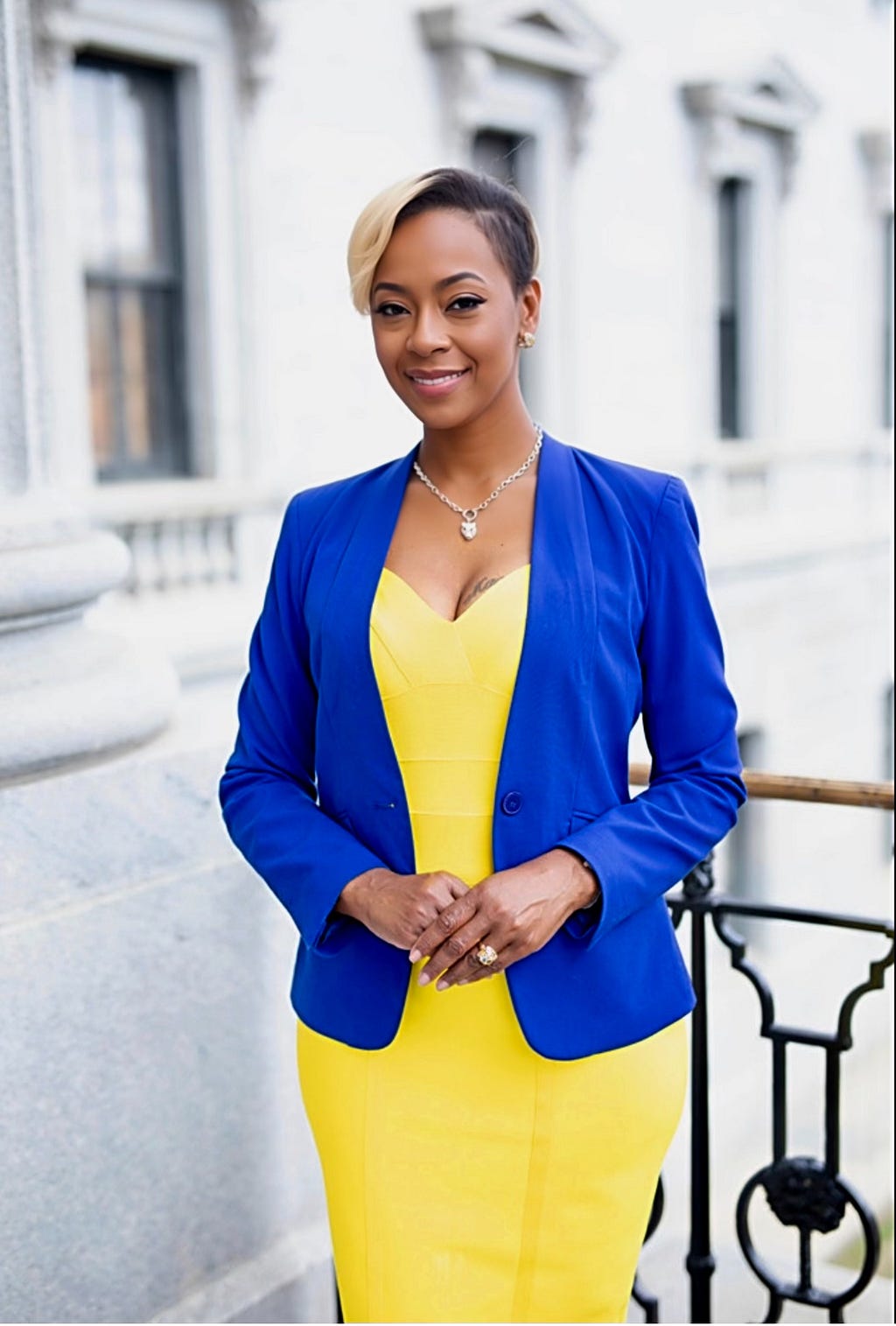Social Media Stars Making a Social Impact: Why & How Dr Macie P Smith of Diversified Training Consultants Group Is Helping To Change Our World

One strategy that is sure fire for me is that of consistency. When you are consistent with your talent, topics, and time you will do well. But also paying attention to your analytics is just as important. I not only focus on the number of people who interact or engage with my posts, but I also look at the reach. Just because someone did not engage with the post, doesn’t mean they didn’t see the post; they saw it. If I could give out any words of advice, I was say #1 stick to your passion, #2 stick to what you know, and #3 stay consistent and reliable. People want to know that you will show up and share information that is relatable, reliable, and life changing. And that’s what I do through the power of social media.
As a part of our series about leaders who are using their social media platform to make a significant social impact, we had the pleasure of interviewing Dr. Macie P. Smith, Diversified Training Consultants Group, LLC.
Dr. Macie P. Smith is a multi-media personality, Licensed Gerontology Social Worker, and best-selling author. She’s an elected official and holds the position of vice chairperson of the Board of Trustees at South Carolina State University. Dr. Smith is the Owner/CEO of Diversified Training Consultants Group, LLC, a geriatric care management practice and media strategy group.
Thank you so much for joining us in this interview series! Can you tell us a story about what brought you to this specific career path?
Well, I came to the realization that I had a great affinity for seniors when I secured my first “real” job as a service coordinator with a state agency helping to coordinate care for those with intellectual and developmental disabilities. Although the work was very rewarding, it was just as stressful. So, I tried looking for another job, but no to avail. When I realized that I was not getting any takers, I was reminded of a quote my dad used to say all the time; he would say, “Use what you got to get what you want.” And I did just that. I began to focus on what was available to me and I mastered the skills necessary to elevate within my industry.
Can you share the most interesting story that happened to you since you began this career?
One of the most interesting and most exciting things that has ever happened to me during my tenure was when I was first elected to the South Carolina State University Board of Trustees, and then again when I was voted to serve in the position of vice chairperson of the Board. It’s interesting, because I never thought I’d be in a position to run for office because I felt that I didn’t fit the typical profile of an “influencer” or a “persuasive” personality. I was a social worker and social workers don’t typically do things like this; so I thought.
It has been said that our mistakes can be our greatest teachers. Can you share a story about the funniest mistake you made when you were first starting? Can you tell us what lesson you learned from that?
I can’t think of any mistakes that I’ve made that were funny. At least none that I want to share. Lol
You have been blessed with success in a career path that can be challenging. Do you have any words of advice for others who may want to embark on this career path, but seem daunted by the prospect of failure?
Failure is inevitable; success is a choice. Choose to succeed and don’t be tethered to your failures, as failures are a recipe for success, but only if you look at them as life’s lessons.
Ok super. Let’s now jump to the core focus of our interview. Can you describe to our readers how you are using your platform to make a significant social impact?
As a multi-media personality, I use my social platforms to provide easily digestible real-world information about Alzheimer’s, dementia, and caregiving. It has always been important to me to share information that is easily accessible, and social media is the platform to do so. Data supports people spend, on average, 151 minutes per day on social media. So, wherever people are, my information needs to be, as well. With more than 6 million people diagnosed with Alzheimer’s disease, access to reliable information is a key component to ending the epidemic.
Can you tell us a story about a particular individual who was impacted by this cause?
Thankfully, there is not just one person positively impacted by me showing up on social media. But, there was one situation where a social media influencer was concerned that her mom wasn’t eating well and displayed some concerning behavior. I immediately inboxed her and recommended that she take her mom in for a swallow assessment. She did what I recommended, she thanked me and shared the situation and information with her followers. This was just one of the moments that confirmed that my work needed to be on social media, as well as traditional media outlets. This type of collaboration and translational messaging is so pivotal when dealing with sensitive situations such as this.
Was there a tipping point that made you decide to focus on this particular area? Can you share a story about that?
The tipping point for me was when my book first reached the Amazon Top 100 Best Sellers list. Then, when the positive reviews started pouring in about how my book helped caregivers take care of their loved ones, I knew, without a doubt, that I was in the right space.
Are there three things the community/society/politicians can do to help you address the root of the problem you are trying to solve?
Absolutely…. #1 The community can keep the conversation alive about what caregivers and people living with Alzheimer’s and dementia are going through. #2 Society can lobby legislation that will provide funding and resources for caregivers who have to choose between working a 9–5 to pay for long term care and staying home to take care of their loved ones. The astronomical cost of long-term care is bankrupting families, and we need to hold the people we put in office accountable for addressing these issues until they are resolved. #3 Politicians and lawmakers can introduce bills and pass laws that would mandate research in this area and require federal payers to fund long term care so that families and those living dementia have a fighting chance to live well with Alzheimer’s or dementia.
Why do you think social media in particular has the power to create social change and create a positive impact on humanity?
Forbes (2024) reported that worldwide there are nearly 5 billion users on social media today. There is power in numbers and these numbers speak volumes. Social media is where most people get their information these days. Therefore, my information must be front and center.
What specific strategies have you been using to promote and advance this cause? Can you recommend any good tips for people who want to follow your lead and use their social platform for a social good?
One strategy that is sure fire for me is that of consistency. When you are consistent with your talent, topics, and time you will do well. But also paying attention to your analytics is just as important. I not only focus on the number of people who interact or engage with my posts, but I also look at the reach. Just because someone did not engage with the post, doesn’t mean they didn’t see the post; they saw it. If I could give out any words of advice, I was say #1 stick to your passion, #2 stick to what you know, and #3 stay consistent and reliable. People want to know that you will show up and share information that is relatable, reliable, and life changing. And that’s what I do through the power of social media.

What are your “5 things I wish someone told me when I first started” and why? Please share a story or example for each.
- Your platform won’t grow overnight; you must pack your patience.
- Everyone won’t love you and will waste no time telling you.
- Just keep posting even if you don’t have a lot of followers.
- It’s more about the quality and less about the quantity.
- Post on all social media platforms because you never know who’s watching.
You are a person of enormous influence. If you could inspire a movement that would bring the most amount of good to the most amount of people, what would that be? You never know what your idea can trigger. 🙂
I would like to see financial support for people who don’t qualify for Medicaid but make less than $100,000 per year. This move will reduce the risk of families going bankrupt because they are trying their best to pay for long term care services and supports (LTSS) for their loved one.
Is there a person in the world, or in the US whom you would love to have a power lunch with, and why? He or she might just see this, especially if we tag them. 🙂
I would like to have a power lunch with Vice President Kamala Harris. She’s my ultimate girl boss! 😊
How can our readers further follow your work online?
Of course, I am active on social media. You can connect with me on Instagram at @drmaciep / Facebook at @drmaciepsmith / Linkedin at @drmaciep. You can also keep up with me on my website www.drmaciesmith.com.
This was very meaningful. Thank you so much!
Social Media Stars Making a Social Impact: Why & How Dr Macie P Smith of Diversified Training… was originally published in Authority Magazine on Medium, where people are continuing the conversation by highlighting and responding to this story.
